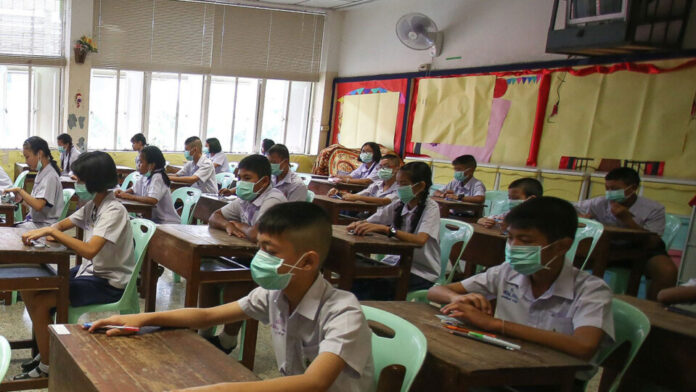The following is a press release from Unicef. Their thoughts and opinions are their own.
NEW YORK/BANGKOK, 24 August 2021 – A child’s first day of school—a landmark moment for the youngest students and their parents around the world—has been delayed due to COVID-19 for an estimated 140 million young minds, UNICEF said in a new analysis released as summer break comes to end in many parts of the world.
For an estimated eight million of these students, the wait for their first day of in-person learning has been over a year and counting, as they live in places where schools have been closed throughout the pandemic.
In Thailand, too many young children entering the first grade have missed out on months of in-person instruction, and primary and secondary-age students are also absent from classrooms due to prolonged school closures in many parts of the country following the third and worst wave of COVID-19 that began in April.
“The first day of school is a landmark moment in a child’s life—setting them off on a life-changing path of personal learning and growth. Most of us can remember countless minor details—what clothes we wore, our teacher’s name, who we sat next to. But for millions of children, that important day has been indefinitely postponed,” said UNICEF Executive Director Henrietta Fore. “As classes resume in many parts of the world, millions of first graders have been waiting to see the inside of a classroom for over a year. Millions more may not see one at all this school term. For the most vulnerable, their risk of never stepping into a classroom in their lifetime is skyrocketing.”
The first grade sets up the building blocks for all future learning, with introductions to reading, writing, and math. It’s also a period when in-person learning helps children gain independence, adapt to new routines, and develop meaningful relationships with teachers and students. In-person learning also enables teachers to identify and address learning delays, mental health issues, and abuse that could negatively affect children’s well-being.
In 2020, schools globally were fully closed for an average of 79 teaching days. However, for 168 million students, after the pandemic began, schools were shuttered for nearly the entire year. Even now, many children are facing an unprecedented second year of disruption to their education. The associated consequences of school closures – learning loss, mental distress, missed vaccinations, and heightened risk of dropout, child labor, and child marriage – will be felt by many children, especially the youngest learners in critical development stages.
Seven in 10 children and young people reported poorer mental health due to the impact of COVID-19 on their lives in a 2020 UNICEF-led survey in Thailand. Following school closures, more than half said they were worried about their studies, and future education and employment.
While countries worldwide are taking some actions to provide remote learning, at least 29 percent of primary students are not being reached. In addition to lack of assets for remote learning, the youngest children may not be able to participate due to a lack of support using the technology, a poor learning environment, pressure to do household chores, or being forced to work.
In Thailand, nearly half of all households surveyed in a 2020 study by the National Statistical Office were not ready for online learning. Fifty-one percent did not have access to devices for online learning; 26 percent did not have internet access for online learning, and 40 percent of parents and caregivers said they did not have time to oversee their children’s online learning.
Studies have shown that positive school experiences during this transition period are a predictor of children’s future social, emotional, and educational outcomes. At the same time, children who fall behind in learning during the early years often stay behind for the remaining time they spend in school, and the gap widens over the years. The number of years of education a child receives also directly affects their future earnings.
UNICEF urges governments to reopen schools for in-person learning as soon as possible and to provide a comprehensive recovery response for students. Together with the World Bank and UNESCO, UNICEFÂ is calling for governments to focus on three key priorities for recovery in schools:
- Targeted programs to bring all children and youth back in school where they can access tailored services to meet their learning, health, psychosocial well-being, and other needs;
- Effective remedial learning to help students catch up on lost learning;
- Support for teachers to address learning losses and incorporate digital technology into their teaching.
“Your first day of school is a day of hope and possibility—a day for getting off to a good start. But not all children are getting off to a good start. Some children are not even starting at all,” said Fore.” We must reopen schools for in-person learning as soon as possible, and we must immediately address the gaps in learning this pandemic has already created. Unless we do, some children may never catch up.”
UNICEF Thailand has been supporting the Ministry of Education to ensure safe school reopening and welcomes the Ministry’s efforts to mitigate the COVID-19 impact on children’s learning, including prioritizing teachers for COVID-19 vaccination and providing free internet for online learning and financial support for students nationwide.
#####




